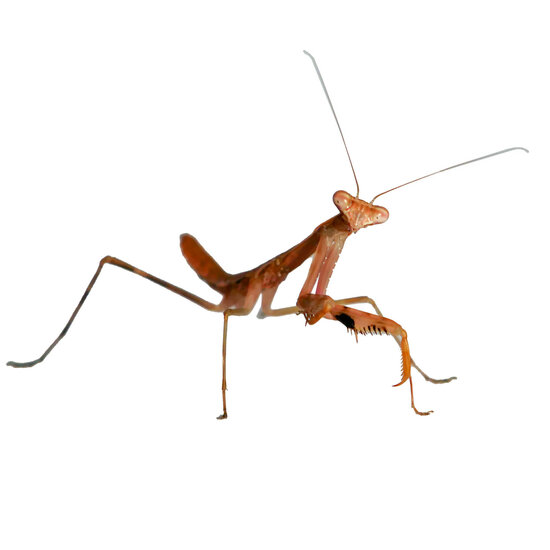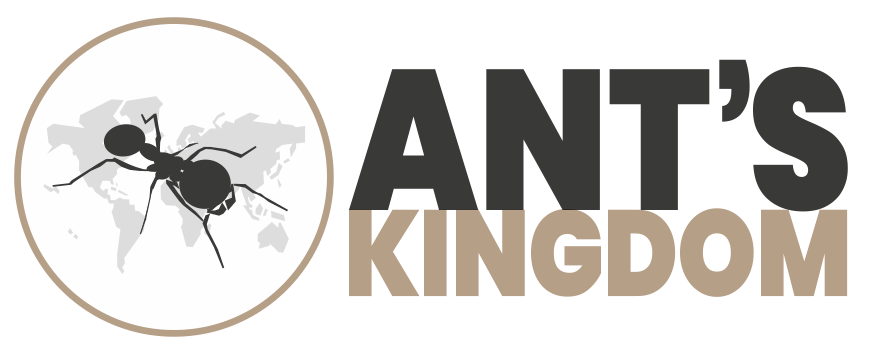

- Ants as pets since 2009 It starts here!
- We ship every working day until 4:30 PM
- Flat shipping costs from €6.99
- Specialists in ants, free advice
Do you have questions about this product?
Or do you need help? Please feel free to contact us, we are happy to help!
Product description
Zebra praying mantis - Omomantis zebrata
The praying mantis stage is from L3 to L7
Information
Omomantis zebrata is a species of praying mantis belonging to the family Mantidae. The common name “Zebra Mantis” comes from the distinctive stripes of zebra-like stripes that cover its body. When disturbed, this praying mantis often shows its remarkable flying capabilities with a flight of up to 50 meters! Omomantis zebrata is native to tropical and subtropical areas of Africa, Asia and Asia. and the Pacific Islands.
Although they are small, they have a great appetite for insects, a spectacular species!
Appearance
Their bodies are decorated with a unique striped pattern of bright, bold colors such as yellow, pink, blue and green, with a black border along the outer edge of each color.
They are relatively small in size, their bodies growing anywhere from 5 to 7 centimeters, with females growing an inch larger than males.
Their front legs are noticeably longer than their hind legs and are equipped with spines with which they catch their prey.
The heads are triangular and have a pair of large eyes in the front, allowing them to look in many directions and detect small movements in the air.
Behavior
Omomantis zebrata is generally a peaceful creature and shows no aggression towards people or other animals. They are considered quite docile and can often be seen admiring their surroundings with their quick eyes.
Omomantis zebrata can also be considered shy, as they tend to hide or move away when afraid of danger. They are also quite active in the morning and evening and may exhibit some curious behavior during this time.
Despite being small, they are quite courageous and will not hesitate to come out and explore their habitat when they feel safe and comfortable. Furthermore, they are also excellent climbers and may even try to climb onto your shoulder and hands when fed.
Food
The Zebra Praying Mantis feeds mainly on other small insects in their natural habitat. They tend to hide during the day and become more active at night to hunt prey more effectively.
Omomantis zebrata occasionally feeds on small flowers with nectar and pollen, but mostly feeds on their normal insect diet. Due to their small size, they cannot tackle prey much larger than themselves.
In their natural habitat, the Zebra Praying Mantis will also eat any nutritious plants or rotting vegetation they come across, so this should also be taken into account when providing food to them in captivity.
Environmental requirements
The ideal temperature is about 24°C, but room temperature is also fine. At night it may be slightly cooler than during the day, but at least 18°C.
This species does not require high humidity, but it is important to spray with water every day or every other day. A target humidity is approximately 40 to 65%. Too moist for too long is the number 1 cause of death for this species.
As with all praying mantis species, this species requires an enclosure that is at least 3x the animal's length high, and at least 2x the animal's length wide. For an adult animal this means at least 27 cm in height and 18 cm in width. A nice size for a terrarium would be 20 x 20 x 35, so that there is also room for fake plants and plenty of perches.
Zebra praying mantis - Omomantis zebrata
The praying mantis stage is from L3 to L7
Information
Omomantis zebrata is a species of praying mantis belonging to the family Mantidae. The common name “Zebra Mantis” comes from the distinctive stripes of zebra-like stripes that cover its body. When disturbed, this praying mantis often shows its remarkable flying capabilities with a flight of up to 50 meters! Omomantis zebrata is native to tropical and subtropical areas of Africa, Asia and Asia. and the Pacific Islands.
Although they are small, they have a great appetite for insects, a spectacular species!
Appearance
Their bodies are decorated with a unique striped pattern of bright, bold colors such as yellow, pink, blue and green, with a black border along the outer edge of each color.
They are relatively small in size, their bodies growing anywhere from 5 to 7 centimeters, with females growing an inch larger than males.
Their front legs are noticeably longer than their hind legs and are equipped with spines with which they catch their prey.
The heads are triangular and have a pair of large eyes in the front, allowing them to look in many directions and detect small movements in the air.
Behavior
Omomantis zebrata is generally a peaceful creature and shows no aggression towards people or other animals. They are considered quite docile and can often be seen admiring their surroundings with their quick eyes.
Omomantis zebrata can also be considered shy, as they tend to hide or move away when afraid of danger. They are also quite active in the morning and evening and may exhibit some curious behavior during this time.
Despite being small, they are quite courageous and will not hesitate to come out and explore their habitat when they feel safe and comfortable. Furthermore, they are also excellent climbers and may even try to climb onto your shoulder and hands when fed.
Food
The Zebra Praying Mantis feeds mainly on other small insects in their natural habitat. They tend to hide during the day and become more active at night to hunt prey more effectively.
Omomantis zebrata occasionally feeds on small flowers with nectar and pollen, but mostly feeds on their normal insect diet. Due to their small size, they cannot tackle prey much larger than themselves.
In their natural habitat, the Zebra Praying Mantis will also eat any nutritious plants or rotting vegetation they come across, so this should also be taken into account when providing food to them in captivity.
Environmental requirements
The ideal temperature is about 24°C, but room temperature is also fine. At night it may be slightly cooler than during the day, but at least 18°C.
This species does not require high humidity, but it is important to spray with water every day or every other day. A target humidity is approximately 40 to 65%. Too moist for too long is the number 1 cause of death for this species.
As with all praying mantis species, this species requires an enclosure that is at least 3x the animal's length high, and at least 2x the animal's length wide. For an adult animal this means at least 27 cm in height and 18 cm in width. A nice size for a terrarium would be 20 x 20 x 35, so that there is also room for fake plants and plenty of perches.
Reviews
No reviews yet
More information...
If you have any questions, please don't hesitate to contact us, we like it! You can reach us via email and WhatsApp. You are welcome in the showroom by appointment for advice and purchase!
Customer service Make an appointment
